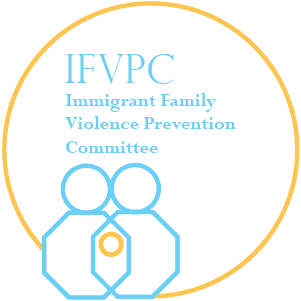
The Immigrant Family Violence Prevention Committee (IFVPC) is an informal group of agencies, students, community members, and people with lived experience of family violence, to support agencies working towards the prevention of family violence among newcomers and diverse ethnocultural communities
IFVPC is aligned with the vision, mission and goals of Community Initiatives against Family Violence (CIAFV).
Background
In 1994, a dedicated group of professionals working with immigrant families formed the Action Committee of Immigrant Women Against Family Violence, which later became the Ethno-Cultural Consultation Committee (ECC). ECC was instrumental in the creation of the Family Violence Prevention Centre (now the Today Family Violence Help Centre) and acted as an advisory board for their programs. The committee also initiated and planned the two-day Diverse Voices conference that became the largest Annual Family Violence Conference in Western Canada. Over the years, the group name changed to the Ethno-cultural Coalition, the Ethno-Cultural Family Violence Committee (EFVC), and currently, it is called the Immigrant Family Violence Prevention Committee. Since 2016 the committee has aligned and supports the Community Initiative Against Family Violence (CIAFV), whose mission is to create a collaborative, coordinated, community response to family violence. In 2020, EFVC’s name changed to the Immigrant Family Violence Prevention Committee (IFVPC).
Online Courses
Did you know IFVPC has created and launched two online learning modules for providers working with immigrant families? Take the free courses by clicking the button below
Terms of Reference
Click here to read our Terms Of Reference
Participate
If you like to attend our educational sessions please sign up to subscribe to the CIAFV newsletter.
Contact us
If you are interested in joining the committee, please contact [email protected]
Agencies previously or currently involved:
- The Action Coalition on Human Trafficking (ACT) Alberta
- Alliance Jeunesse-Famille de l’Alberta Société (AJFAS)
- Assist Community Services Centre (ASSIST)
- Candora Society
- Catholic Social Services (CSS)
- Centre for Public Legal Education Association (CPLEA)
- City of Edmonton
- Compass Sexual Health
- enCompass Community Safety Agency
- Edmonton Mennonite Centre for Newcomers (EMCN)
- Edmonton Multicultural Health Brokers Co-op
- Edmonton Violence Prevention Centre, Changing Pathways Group
- Islamic Family & Social Services Association (IFSSA)
- REACH Edmonton
- Sexual Assault Centre of Edmonton (SACE)
- The Today Centre (TC)
- Win House, Carol’s House
- Wings of Providence Second Stage Shelter – Edmonton